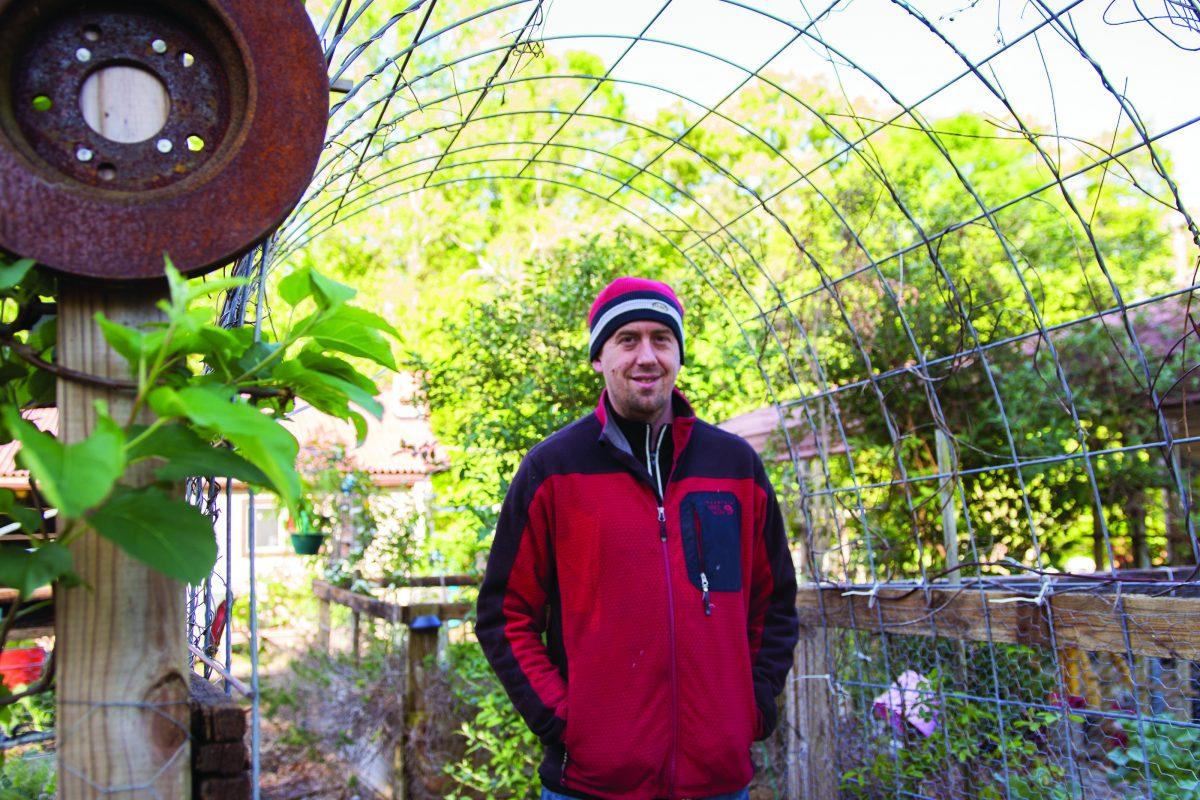Down a beaten dirt road off Highway 82, a small farm sits in the middle of a rural neighborhood. Matt Nappe is busy preparing his homegrown produce for the upcoming harvest season.
Small-scale natural farming like Nappe’s comes with a unique set of challenges in Starkville, such as nutrient-poor soil.
The U.S. Department of Agriculture’s most recent soil survey of Oktibbeha County found some soils here have inadequate surfaces for yielding crops.
Nappe experienced this soil firsthand when he started naturally farming in his front yard four years ago.
“I add a lot of things on top of my soil,” Nappe said. “I can’t even imagine how many tons of wood chips and stuff that I bought, in addition to all the manure that my animals produce.”
Nappe owns Lakeshore Berries and Gardens in town, which is on a six-acre plot of land. Most of the land is untilled, as he only grows produce in the area immediately surrounding his house.
Nappe said Starkville soil has a high clay content, which is not sufficient for growing most fruits and vegetables.
“It’s taken a lot of work to get to a level where you just have a couple of inches of quality soil,” Nappe said. “That’s why you’ve got to take care of it, because it’s so hard to recreate.”
Sam McLemore owns a two-acre farm in Starkville called Bountiful Harvest Farms. He also said the soil needs additional substances to yield produce.
“A lot of people complain about clay soil,” McLemore said. “It is tough, especially when it’s wet or extremely dry. Around here, a lot of times you need a little bit of lime to make the soil a little less acidic.”
McLemore uses five different methods of fertilizing to keep his soil alive. One of these methods uses clover or buckwheat as a cover crop. Cover crops are not harvested, but they are mowed and left to compost on the land.
“Rather than harvesting a crop and removing it from the land, we let it grow,” McLemore said. “All those roots are building up the soil.”
In order to understand what nutrients his soil lacks, McLemore uses the Mississippi State University Extension Service to analyze his soil.
“You scoop up some of your soil where you’re going to grow, put it in a box, give them six bucks and send it to them,” McLemore said. “In a week, they give you the information back of what your soil has in it.”
Thomas Legiandenyi, the agricultural extension agent of Oktibbeha County, explained how the MSU Extension Service sends soil samples to agriculture labs on campus and translates the results for farmers.
“Once they get these results in, they are just figures,” Legiandenyi said. “We explain it in a language they can understand, and then they apply that knowledge and get good results. They need to tell you what kind of maintenance you need to do before you plant there.”
McLemore uses the MSU Extension Service to identify pests, which are also a challenge for farmers in Starkville.
“There’s been a handful of different things Extension has helped with,” McLemore said. “They’re there to help us.”
Blake Layton, an entomologist for the MSU Extension Service, explained the benefit and necessity of pest identification for farmers.
“Once you’ve identified the pest, you can try to understand a little about the biology of that pest,” Layton said. “Because sometimes you can know when to treat that pest, when not to treat, or when treatment is not going to be effective.”
McLemore, a Certified Naturally Grown producer, said he follows the organic practices of the Natural Organic Standards Program, which prohibits the use of synthetic herbicides, pesticides, fertilizers or genetically modified organisms.
“We don’t use any herbicides or insecticides at all,” McLemore said.
Layton said often there are not organic solutions to pest problems.
“For organic production, there are pests we can control, like caterpillars,” Layton said. “But for stinkbugs and leaf-footed bugs, there are no good organic treatments. That’s the real challenge there.”
Nappe also follows organic practices, and has issues controlling pests.
“There’s a squash beetle that always wipes out my squash and zucchini every year,” Nappe said. “There’s not really a good organic solution to it.”
The MSU Extension Service offers educational publications online, detailing the common pests in the area and how to combat them. Picking individual squash beetles off plants is the only organic control the publication cites.
Nappe said he cannot physically pick pests off every plant, so the problem continues. Nappe chooses not to use insecticides if they are harmful or outside of an organic label.
“We eat most of what we grow,” Nappe said. “So, I don’t like that stuff.”
Layton said a lot of small-scale farmers feel the same way. When he assists farmers and gardeners, he often cannot advise them to use insecticides.
“We find that people are committed to organic production,” Layton said. “This is much more of a challenge here in Starkville.”
Layton said if farmers want to grow organically, they need a market willing to accept the inevitable pests on their produce.
“It’s really hard to produce plants without using some sort of insecticide,” Layton said. “As long as you do your homework and make sure it is safe to use in a prescribed way, then that’s going to be fine.”
Although there are natural challenges, McLemore and Nappe have found a niche market to sell to in Starkville. Both farmers participate in community-supported agriculture, which is a kind of subscription service where customers can receive weekly produce.
“We’ve gotten a lot of support from the community,” said McLemore, who serves 60 families through CSA.
Another way small-scale farmers can profit is by participating in the Starkville Community Market, which offers farmers a place to sell produce starting in April.
Nappe takes kale and blueberries to sell at the market, and the berries are always popular.
“It usually sells out within the first 10 minutes,” Nappe said.
Lakeshore Berries and Gardens is not Nappe’s primary source of income, though. He works full time in politics, and his wife is a professor.
McLemore sells his produce to several different customers, and created a sustainable business model with his organic practices.
“We sell to a few restaurants every week,” McLemore said. “We have our CSA members. Next week, we’ll start selling at the market.”
Bountiful Harvest Farms is McLemore’s primary source of income. He employs three other workers part-time. However, he also works part-time setting up tailgating tents during football season. He spends most of his time year-round working on the farm.
“There’s still so much to do,” McLemore said. “A farm will take everything you give it.”
McLemore said he enjoys farming in Starkville because of the community and history.
“I like that we can grow stuff pretty much year-round,” McLemore said. “We’re in a good spot. It’s good soil and a good community of eaters.”
Small-scale agriculture prominent in Starkville
0
Donate to The Reflector
Your donation will support the student journalists of Mississippi State University. Your contribution will allow us to purchase equipment and cover our annual website hosting costs.
More to Discover



















































































